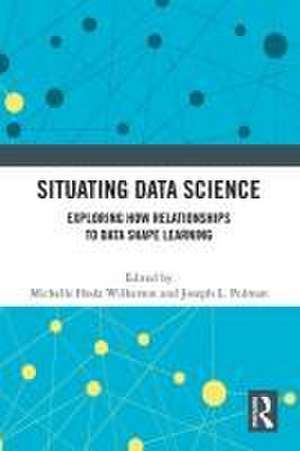Situating Data Science: Exploring How Relationships to Data Shape Learning
Editat de Michelle Hoda Wilkerson, Joseph L. Polmanen Limba Engleză Paperback – 29 ian 2024
Drawing from theories of learning and identity development in the learning sciences, this volume investigates the impacts of these complex relationships on how learners think about, use, and share data, including their understandings of data in light of history, race, geography, and politics. More than just using ‘real world examples’ to motivate students to work with data, this book demonstrates how learners’ relationships to data shape how they approach those data with agency, as part of their social and cultural lives. Together, the contributions offer a vision of how the learning sciences can contribute to a more expansive, socially aware, and transformative Data Science Education.
The chapters in this book were originally published as a special issue of the Journal of the Learning Sciences.
| Toate formatele și edițiile | Preț | Express |
|---|---|---|
| Paperback (1) | 322.08 lei 6-8 săpt. | |
| Taylor & Francis – 29 ian 2024 | 322.08 lei 6-8 săpt. | |
| Hardback (1) | 880.34 lei 3-5 săpt. | +19.12 lei 6-12 zile |
| Taylor & Francis – 14 apr 2022 | 880.34 lei 3-5 săpt. | +19.12 lei 6-12 zile |
Preț: 322.08 lei
Preț vechi: 402.59 lei
-20% Nou
Puncte Express: 483
Preț estimativ în valută:
61.63€ • 64.48$ • 51.20£
61.63€ • 64.48$ • 51.20£
Carte tipărită la comandă
Livrare economică 03-17 aprilie
Preluare comenzi: 021 569.72.76
Specificații
ISBN-13: 9780367760748
ISBN-10: 0367760746
Pagini: 198
Dimensiuni: 152 x 229 mm
Greutate: 0.45 kg
Ediția:1
Editura: Taylor & Francis
Colecția Routledge
Locul publicării:Oxford, United Kingdom
ISBN-10: 0367760746
Pagini: 198
Dimensiuni: 152 x 229 mm
Greutate: 0.45 kg
Ediția:1
Editura: Taylor & Francis
Colecția Routledge
Locul publicării:Oxford, United Kingdom
Public țintă
Postgraduate and UndergraduateNotă biografică
Michelle Hoda Wilkerson is Associate Professor in the Graduate School of Education and Graduate Group in Science and Mathematics Education at the University of California, Berkeley, USA. Her research explores how young people learn scientific computing through engaging with and authoring their own simulations, data visualizations, and other computational artifacts.
Joseph L. Polman is Professor of Learning Sciences and Human Development, as well as Associate Dear for Research in the School of Education at University of Colorado, Boulder, USA. He designs and studies project-based learning environments for youth in schools and community programs, with particular focus on civic engagement and identity.
Joseph L. Polman is Professor of Learning Sciences and Human Development, as well as Associate Dear for Research in the School of Education at University of Colorado, Boulder, USA. He designs and studies project-based learning environments for youth in schools and community programs, with particular focus on civic engagement and identity.
Cuprins
1. Introduction: Situating Data Science—Exploring How Relationships to Data Shape Learning 2. At Home with Data: Family Engagements with Data Involved in Type 1 Diabetes Management 3. Examining Spontaneous Perspective Taking and Fluid Self-to-Data Relationships in Informal Open-Ended Data Exploration 4. Learning at the Intersection of Self and Society: The Family Geobiography as a Context for Data Science Education 5. Authoring Data Stories in a Media Makerspace: Adolescents Developing Critical Data Literacies 6. From Data Collectors to Data Producers: Shifting Students’ Relationship to Data, Lisa Hardy 7. Scripts and Counterscripts in Community-Based Data Science: Participatory Digital Mapping and the Pursuit of a Third Space 8. Learning to Reason with Data: How Did We Get Here and What Do We Know? 9. Educating Data Scientists and Data Literate Citizens for a New Generation of Data
Descriere
This book explores how one distinguishing feature of Data Science – its focus on data collected from social and environmental contexts within which learners often find themselves deeply embedded – suggests serious implications for learning and education.
